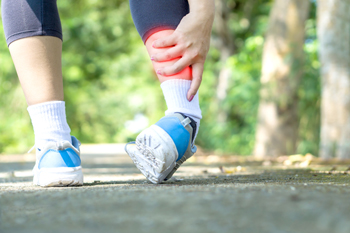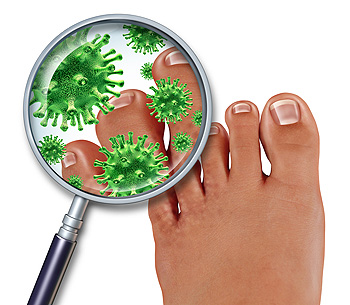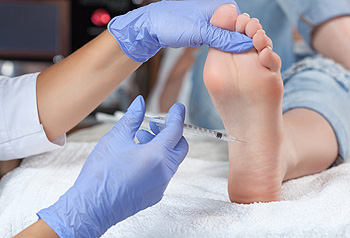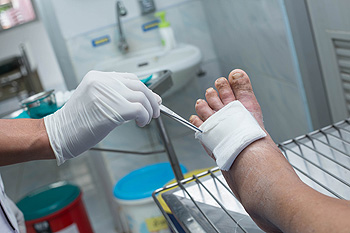What Causes Swollen Feet During Pregnancy?
 Many pregnant women often notice that their feet are swollen. Hormone changes can play a significant role in developing swollen feet, in addition to the weight that is gained. Swelling may increase as the due date approaches and may be especially uncomfortable in warmer weather. If the swelling is mild, there’s typically no reason to be concerned. Some pregnant women have found methods that can reduce swelling, such as lying on the left side while sleeping, and drinking plenty of fresh water. It may also help to elevate the feet frequently during the day. Stretching regularly may also be beneficial in reducing swollen ankles and feet. If you would like more information about how to manage swollen feet during pregnancy, speak to your local podiatrist.
Many pregnant women often notice that their feet are swollen. Hormone changes can play a significant role in developing swollen feet, in addition to the weight that is gained. Swelling may increase as the due date approaches and may be especially uncomfortable in warmer weather. If the swelling is mild, there’s typically no reason to be concerned. Some pregnant women have found methods that can reduce swelling, such as lying on the left side while sleeping, and drinking plenty of fresh water. It may also help to elevate the feet frequently during the day. Stretching regularly may also be beneficial in reducing swollen ankles and feet. If you would like more information about how to manage swollen feet during pregnancy, speak to your local podiatrist.
Pregnant women with swollen feet can be treated with a variety of different methods that are readily available. For more information about other cures for swollen feet during pregnancy, consult with Donald Manger, DPM from Associated Podiatric Physicians, PA. Our doctor will attend to all of your foot and ankle needs.
What Foot Problems Can Arise During Pregnancy?
One problem that can occur is overpronation, which occurs when the arch of the foot flattens and tends to roll inward. This can cause pain and discomfort in your heels while you’re walking or even just standing up, trying to support your baby.
Another problem is edema, or swelling in the extremities. This often affects the feet during pregnancy but tends to occur in the later stages.
How Can I Keep My Feet Healthy During Pregnancy?
- Wearing orthotics can provide extra support for the feet and help distribute weight evenly
- Minimize the amount of time spent walking barefoot
- Wear shoes with good arch support
- Wear shoes that allow for good circulation to the feet
- Elevate feet if you experience swelling
- Massage your feet
- Get regular, light exercise, such as walking, to promote blood circulation to the feet
If you have any questions please feel free to contact our office located in Hamilton Township, NJ . We offer the newest diagnostic and treatment technologies for all your foot and ankle needs.
Symptoms of an Achilles Tendon Injury
 If you are experiencing pain in the calf and in the back of the heel, you may have what is known as an Achilles tendon injury. This type of injury can produce severe discomfort, and it may be difficult to walk. It is a common ailment among people who enjoy running, and may occur from a lack of stretching the muscles before running or jogging begins. Additionally, it may develop as a result of wearing shoes that do not fit correctly, or from an abrupt change in participating in sporting activities. The Achilles tendon connects the heel to the calf muscles, and if it should become inflamed, Achilles tendinopathy may occur. Some of the symptoms that are associated with this type of injury can include stiffness in the ankle and calf, and the first steps taken after arising in the morning may be uncomfortable. If you have any pain in the heel and the calf, it is strongly suggested that you speak to a podiatrist as quickly as possible who can properly diagnosis and treat an Achilles tendon injury.
If you are experiencing pain in the calf and in the back of the heel, you may have what is known as an Achilles tendon injury. This type of injury can produce severe discomfort, and it may be difficult to walk. It is a common ailment among people who enjoy running, and may occur from a lack of stretching the muscles before running or jogging begins. Additionally, it may develop as a result of wearing shoes that do not fit correctly, or from an abrupt change in participating in sporting activities. The Achilles tendon connects the heel to the calf muscles, and if it should become inflamed, Achilles tendinopathy may occur. Some of the symptoms that are associated with this type of injury can include stiffness in the ankle and calf, and the first steps taken after arising in the morning may be uncomfortable. If you have any pain in the heel and the calf, it is strongly suggested that you speak to a podiatrist as quickly as possible who can properly diagnosis and treat an Achilles tendon injury.
Achilles tendon injuries need immediate attention to avoid future complications. If you have any concerns, contact the podiatrists of Associated Podiatric Physicians, PA. Our doctors can provide the care you need to keep you pain-free and on your feet.
What Is the Achilles Tendon?
The Achilles tendon is a tendon that connects the lower leg muscles and calf to the heel of the foot. It is the strongest tendon in the human body and is essential for making movement possible. Because this tendon is such an integral part of the body, any injuries to it can create immense difficulties and should immediately be presented to a doctor.
What Are the Symptoms of an Achilles Tendon Injury?
There are various types of injuries that can affect the Achilles tendon. The two most common injuries are Achilles tendinitis and ruptures of the tendon.
Achilles Tendinitis Symptoms
- Inflammation
- Dull to severe pain
- Increased blood flow to the tendon
- Thickening of the tendon
Rupture Symptoms
- Extreme pain and swelling in the foot
- Total immobility
Treatment and Prevention
Achilles tendon injuries are diagnosed by a thorough physical evaluation, which can include an MRI. Treatment involves rest, physical therapy, and in some cases, surgery. However, various preventative measures can be taken to avoid these injuries, such as:
- Thorough stretching of the tendon before and after exercise
- Strengthening exercises like calf raises, squats, leg curls, leg extensions, leg raises, lunges, and leg presses
If you have any questions please feel free to contact our office located in Hamilton Township, NJ. We offer the newest diagnostic tools and technology to treat your foot and ankle needs.
Read more about What are Achilles Tendon InjuriesPreventing Toenail Fungus
 Toenail fungus is an infection that forms underneath toenails. When this occurs, the nail usually darkens and may begin to smell. This infection can spread to other nails or skin, so it is important to treat it. Over time, the toenail might begin to thicken and the infection might become painful. Thankfully, there are ways to prevent toenail fungus. Proper foot hygiene is the first step in preventing infection. Washing your feet and making sure to fully dry them will help keep infectious organisms out of your toenails. In public areas, wear shower shoes and avoid wearing shoes or socks that trap excessive moisture, because damp environments allow infections to thrive. It is also important to cut your toenails straight across and to make sure any pedicure tools used on your feet are clean. If you would like more information on how to properly prevent toenail fungus, then it is recommended you consult with a podiatrist.
Toenail fungus is an infection that forms underneath toenails. When this occurs, the nail usually darkens and may begin to smell. This infection can spread to other nails or skin, so it is important to treat it. Over time, the toenail might begin to thicken and the infection might become painful. Thankfully, there are ways to prevent toenail fungus. Proper foot hygiene is the first step in preventing infection. Washing your feet and making sure to fully dry them will help keep infectious organisms out of your toenails. In public areas, wear shower shoes and avoid wearing shoes or socks that trap excessive moisture, because damp environments allow infections to thrive. It is also important to cut your toenails straight across and to make sure any pedicure tools used on your feet are clean. If you would like more information on how to properly prevent toenail fungus, then it is recommended you consult with a podiatrist.
For more information about treatment, contact the podiatrists of Associated Podiatric Physicians, PA. Our doctors can provide the care you need to keep you pain-free and on your feet.
Toenail Fungus Treatment
Toenail fungus is a condition that affects many people and can be especially hard to get rid of. Fortunately, there are several methods to go about treating and avoiding it.
Antifungals & Deterrence
Oral antifungal medicine has been shown to be effective in many cases. It is important to consult with a podiatrist to determine the proper regiment for you, or potentially explore other options.
Applying foot powder on the feet and shoes helps keep the feet free of moisture and sweat.
Sandals or open toed shoes – Wearing these will allow air movement and help keep feet dry. They also expose your feet to light, which fungus cannot tolerate. Socks with moisture wicking material also help as well.
If you have any questions please feel free to contact our office located in Hamilton Township, NJ. We offer the newest diagnostic tools and technology to treat your foot and ankle needs.
Read more about Toenail FungusPreventing Toenail Fungus
 Toenail fungus is an infection that forms underneath toenails. When this occurs, the nail usually darkens and may begin to smell. This infection can spread to other nails or skin, so it is important to treat it. Over time, the toenail might begin to thicken and the infection might become painful. Thankfully, there are ways to prevent toenail fungus. Proper foot hygiene is the first step in preventing infection. Washing your feet and making sure to fully dry them will help keep infectious organisms out of your toenails. In public areas, wear shower shoes and avoid wearing shoes or socks that trap excessive moisture, because damp environments allow infections to thrive. It is also important to cut your toenails straight across and to make sure any pedicure tools used on your feet are clean. If you would like more information on how to properly prevent toenail fungus, then it is recommended you consult with a podiatrist.
Toenail fungus is an infection that forms underneath toenails. When this occurs, the nail usually darkens and may begin to smell. This infection can spread to other nails or skin, so it is important to treat it. Over time, the toenail might begin to thicken and the infection might become painful. Thankfully, there are ways to prevent toenail fungus. Proper foot hygiene is the first step in preventing infection. Washing your feet and making sure to fully dry them will help keep infectious organisms out of your toenails. In public areas, wear shower shoes and avoid wearing shoes or socks that trap excessive moisture, because damp environments allow infections to thrive. It is also important to cut your toenails straight across and to make sure any pedicure tools used on your feet are clean. If you would like more information on how to properly prevent toenail fungus, then it is recommended you consult with a podiatrist.
For more information about treatment, contact Donald Manger, DPM of Associated Podiatric Physicians, PA. Our doctor can provide the care you need to keep you pain-free and on your feet.
Toenail Fungus Treatment
Toenail fungus is a condition that affects many people and can be especially hard to get rid of. Fortunately, there are several methods to go about treating and avoiding it.
Antifungals & Deterrence
Oral antifungal medicine has been shown to be effective in many cases. It is important to consult with a podiatrist to determine the proper regiment for you, or potentially explore other options.
Applying foot powder on the feet and shoes helps keep the feet free of moisture and sweat.
Sandals or open toed shoes – Wearing these will allow air movement and help keep feet dry. They also expose your feet to light, which fungus cannot tolerate. Socks with moisture wicking material also help as well.
If you have any questions please feel free to contact our office located in Hamilton Township, NJ . We offer the newest diagnostic tools and technology to treat your foot and ankle needs.
Symptoms of an Achilles Tendon Injury
 If you are experiencing pain in the calf and in the back of the heel, you may have what is known as an Achilles tendon injury. This type of injury can produce severe discomfort, and it may be difficult to walk. It is a common ailment among people who enjoy running, and may occur from a lack of stretching the muscles before running or jogging begins. Additionally, it may develop as a result of wearing shoes that do not fit correctly, or from an abrupt change in participating in sporting activities. The Achilles tendon connects the heel to the calf muscles, and if it should become inflamed, Achilles tendinopathy may occur. Some of the symptoms that are associated with this type of injury can include stiffness in the ankle and calf, and the first steps taken after arising in the morning may be uncomfortable. If you have any pain in the heel and the calf, it is strongly suggested that you speak to a podiatrist as quickly as possible who can properly diagnosis and treat an Achilles tendon injury.
If you are experiencing pain in the calf and in the back of the heel, you may have what is known as an Achilles tendon injury. This type of injury can produce severe discomfort, and it may be difficult to walk. It is a common ailment among people who enjoy running, and may occur from a lack of stretching the muscles before running or jogging begins. Additionally, it may develop as a result of wearing shoes that do not fit correctly, or from an abrupt change in participating in sporting activities. The Achilles tendon connects the heel to the calf muscles, and if it should become inflamed, Achilles tendinopathy may occur. Some of the symptoms that are associated with this type of injury can include stiffness in the ankle and calf, and the first steps taken after arising in the morning may be uncomfortable. If you have any pain in the heel and the calf, it is strongly suggested that you speak to a podiatrist as quickly as possible who can properly diagnosis and treat an Achilles tendon injury.
Achilles tendon injuries need immediate attention to avoid future complications. If you have any concerns, contact Donald Manger, DPM of Associated Podiatric Physicians, PA. Our doctor can provide the care you need to keep you pain-free and on your feet.
What Is the Achilles Tendon?
The Achilles tendon is a tendon that connects the lower leg muscles and calf to the heel of the foot. It is the strongest tendon in the human body and is essential for making movement possible. Because this tendon is such an integral part of the body, any injuries to it can create immense difficulties and should immediately be presented to a doctor.
What Are the Symptoms of an Achilles Tendon Injury?
There are various types of injuries that can affect the Achilles tendon. The two most common injuries are Achilles tendinitis and ruptures of the tendon.
Achilles Tendinitis Symptoms
- Inflammation
- Dull to severe pain
- Increased blood flow to the tendon
- Thickening of the tendon
Rupture Symptoms
- Extreme pain and swelling in the foot
- Total immobility
Treatment and Prevention
Achilles tendon injuries are diagnosed by a thorough physical evaluation, which can include an MRI. Treatment involves rest, physical therapy, and in some cases, surgery. However, various preventative measures can be taken to avoid these injuries, such as:
- Thorough stretching of the tendon before and after exercise
- Strengthening exercises like calf raises, squats, leg curls, leg extensions, leg raises, lunges, and leg presses
If you have any questions please feel free to contact our office located in Hamilton Township, NJ . We offer the newest diagnostic tools and technology to treat your foot and ankle needs.
Foot Symptoms Associated with Diabetes
 Did you know that diabetes is responsible for over 50% of all foot amputations in the United States? That is why diabetes experts recommend that everyone, whether they have type 1 or type 2 diabetes, protect their feet with daily foot checks, wear supportive fitting socks and shoes, and complete a comprehensive foot exam by a podiatrist at least once a year. Two main foot problems that can occur with people who have diabetes are Peripheral Vascular Disease and Diabetic Neuropathy. Other foot symptoms associated with people who have diabetes include loss of feeling, numbness or tingling sensations, blisters, skin discoloration, red streaks, and staining on their socks. If an infection develops the symptoms can worsen and include fever, chills, uncontrollable blood sugar, shock, and redness. With diabetes, since there can be numerous complications in the feet, it is strongly recommended that you consult with a podiatrist for the best prevention and treatment methods.
Did you know that diabetes is responsible for over 50% of all foot amputations in the United States? That is why diabetes experts recommend that everyone, whether they have type 1 or type 2 diabetes, protect their feet with daily foot checks, wear supportive fitting socks and shoes, and complete a comprehensive foot exam by a podiatrist at least once a year. Two main foot problems that can occur with people who have diabetes are Peripheral Vascular Disease and Diabetic Neuropathy. Other foot symptoms associated with people who have diabetes include loss of feeling, numbness or tingling sensations, blisters, skin discoloration, red streaks, and staining on their socks. If an infection develops the symptoms can worsen and include fever, chills, uncontrollable blood sugar, shock, and redness. With diabetes, since there can be numerous complications in the feet, it is strongly recommended that you consult with a podiatrist for the best prevention and treatment methods.
Diabetic foot care is important in preventing foot ailments such as ulcers. If you are suffering from diabetes or have any other concerns about your feet, contact the podiatrists from Associated Podiatric Physicians, PA. Our doctors can provide the care you need to keep you pain-free and on your feet.
Diabetic Foot Care
Diabetes affects millions of people every year. The condition can damage blood vessels in many parts of the body, especially the feet. Because of this, taking care of your feet is essential if you have diabetes, and having a podiatrist help monitor your foot health is highly recommended.
The Importance of Caring for Your Feet
- Routinely inspect your feet for bruises or sores.
- Wear socks that fit your feet comfortably.
- Wear comfortable shoes that provide adequate support.
Patients with diabetes should have their doctor monitor their blood levels, as blood sugar levels play such a huge role in diabetic care. Monitoring these levels on a regular basis is highly advised.
It is always best to inform your healthcare professional of any concerns you may have regarding your feet, especially for diabetic patients. Early treatment and routine foot examinations are keys to maintaining proper health, especially because severe complications can arise if proper treatment is not applied.
If you have any questions please feel free to contact our office located in Hamilton Township, NJ. We offer the newest diagnostic and treatment technologies for all your foot and ankle needs.
Read more about Diabetic Foot CareFoot Symptoms Associated with Diabetes
 Did you know that diabetes is responsible for over 50% of all foot amputations in the United States? That is why diabetes experts recommend that everyone, whether they have type 1 or type 2 diabetes, protect their feet with daily foot checks, wear supportive fitting socks and shoes, and complete a comprehensive foot exam by a podiatrist at least once a year. Two main foot problems that can occur with people who have diabetes are Peripheral Vascular Disease and Diabetic Neuropathy. Other foot symptoms associated with people who have diabetes include loss of feeling, numbness or tingling sensations, blisters, skin discoloration, red streaks, and staining on their socks. If an infection develops the symptoms can worsen and include fever, chills, uncontrollable blood sugar, shock, and redness. With diabetes, since there can be numerous complications in the feet, it is strongly recommended that you consult with a podiatrist for the best prevention and treatment methods.
Did you know that diabetes is responsible for over 50% of all foot amputations in the United States? That is why diabetes experts recommend that everyone, whether they have type 1 or type 2 diabetes, protect their feet with daily foot checks, wear supportive fitting socks and shoes, and complete a comprehensive foot exam by a podiatrist at least once a year. Two main foot problems that can occur with people who have diabetes are Peripheral Vascular Disease and Diabetic Neuropathy. Other foot symptoms associated with people who have diabetes include loss of feeling, numbness or tingling sensations, blisters, skin discoloration, red streaks, and staining on their socks. If an infection develops the symptoms can worsen and include fever, chills, uncontrollable blood sugar, shock, and redness. With diabetes, since there can be numerous complications in the feet, it is strongly recommended that you consult with a podiatrist for the best prevention and treatment methods.
Diabetic foot care is important in preventing foot ailments such as ulcers. If you are suffering from diabetes or have any other concerns about your feet, contact Donald Manger, DPM from Associated Podiatric Physicians, PA. Our doctor can provide the care you need to keep you pain-free and on your feet.
Diabetic Foot Care
Diabetes affects millions of people every year. The condition can damage blood vessels in many parts of the body, especially the feet. Because of this, taking care of your feet is essential if you have diabetes, and having a podiatrist help monitor your foot health is highly recommended.
The Importance of Caring for Your Feet
- Routinely inspect your feet for bruises or sores.
- Wear socks that fit your feet comfortably.
- Wear comfortable shoes that provide adequate support.
Patients with diabetes should have their doctor monitor their blood levels, as blood sugar levels play such a huge role in diabetic care. Monitoring these levels on a regular basis is highly advised.
It is always best to inform your healthcare professional of any concerns you may have regarding your feet, especially for diabetic patients. Early treatment and routine foot examinations are keys to maintaining proper health, especially because severe complications can arise if proper treatment is not applied.
If you have any questions please feel free to contact our office located in Hamilton Township, NJ . We offer the newest diagnostic and treatment technologies for all your foot and ankle needs.
Good Posture and Running
 Running injuries can be painful when they happen, and they can be difficult to treat. Research has indicated there are methods that may prevent running injuries from occurring in the first place. These consist of running with proper form, landing on the middle of the foot instead of on the heels, and stretching thoroughly after the run is completed. Additionally, it is helpful to begin running at a slower pace, while gradually increasing the speed. The overall health of the feet will benefit when good posture is maintained throughout the run, and it is advantageous to wear new running shoes every 500 miles. Many runners set reasonable goals, and this allows them to enjoy the sport of running. If you would like additional information about how running injuries can affect your feet, please speak with a podiatrist.
Running injuries can be painful when they happen, and they can be difficult to treat. Research has indicated there are methods that may prevent running injuries from occurring in the first place. These consist of running with proper form, landing on the middle of the foot instead of on the heels, and stretching thoroughly after the run is completed. Additionally, it is helpful to begin running at a slower pace, while gradually increasing the speed. The overall health of the feet will benefit when good posture is maintained throughout the run, and it is advantageous to wear new running shoes every 500 miles. Many runners set reasonable goals, and this allows them to enjoy the sport of running. If you would like additional information about how running injuries can affect your feet, please speak with a podiatrist.
Exercising your feet regularly with the proper foot wear is a great way to prevent injuries. If you have any concerns about your feet, contact the podiatrists of Associated Podiatric Physicians, PA. Our doctors will treat your foot and ankle needs.
How to Prevent Running Injuries
Many common running injuries are caused by overuse and overtraining. When the back of the kneecap starts wearing out and starts causing pain in your knee, this is commonly referred to as runner’s knee. Runner’s knee is a decrease in strength in your quadriceps and can occur if you’re not wearing properly fitted or supporting shoes. To prevent runner’s knee, focusing on hip strengthening is a good idea, as well as strengthening your quads to keep the kneecaps aligned.
What Are Some Causes of Running Injuries?
- One cause of a common running injury is called iliotibial band syndrome.
- Plantar fasciitis is also another common injury.
- Stress fractures can occur from overtraining, lack of calcium, or even your running style.
Best Ways to Prevent Running Injuries
- Wear footwear that fits properly and suits your running needs.
- Running shoes are the only protective gear that runners have to safeguard them from injury.
- Make a training schedule. Adding strengthening exercises as well as regular stretching can help keep you strong and limber and can lessen the possibility of injuries.
- Stretching keeps muscles limber; this will help you gain better flexibility.
If you have any questions please feel free to contact our office located in Hamilton Township, NJ. We offer the newest diagnostic and treatment technologies for all your foot and ankle needs.
Read more about How to Prevent Running InjuriesGood Posture and Running
 Running injuries can be painful when they happen, and they can be difficult to treat. Research has indicated there are methods that may prevent running injuries from occurring in the first place. These consist of running with proper form, landing on the middle of the foot instead of on the heels, and stretching thoroughly after the run is completed. Additionally, it is helpful to begin running at a slower pace, while gradually increasing the speed. The overall health of the feet will benefit when good posture is maintained throughout the run, and it is advantageous to wear new running shoes every 500 miles. Many runners set reasonable goals, and this allows them to enjoy the sport of running. If you would like additional information about how running injuries can affect your feet, please speak with a podiatrist.
Running injuries can be painful when they happen, and they can be difficult to treat. Research has indicated there are methods that may prevent running injuries from occurring in the first place. These consist of running with proper form, landing on the middle of the foot instead of on the heels, and stretching thoroughly after the run is completed. Additionally, it is helpful to begin running at a slower pace, while gradually increasing the speed. The overall health of the feet will benefit when good posture is maintained throughout the run, and it is advantageous to wear new running shoes every 500 miles. Many runners set reasonable goals, and this allows them to enjoy the sport of running. If you would like additional information about how running injuries can affect your feet, please speak with a podiatrist.
Exercising your feet regularly with the proper foot wear is a great way to prevent injuries. If you have any concerns about your feet, contact Donald Manger, DPM of Associated Podiatric Physicians, PA. Our doctor will treat your foot and ankle needs.
How to Prevent Running Injuries
Many common running injuries are caused by overuse and overtraining. When the back of the kneecap starts wearing out and starts causing pain in your knee, this is commonly referred to as runner’s knee. Runner’s knee is a decrease in strength in your quadriceps and can occur if you’re not wearing properly fitted or supporting shoes. To prevent runner’s knee, focusing on hip strengthening is a good idea, as well as strengthening your quads to keep the kneecaps aligned.
What Are Some Causes of Running Injuries?
- One cause of a common running injury is called iliotibial band syndrome.
- Plantar fasciitis is also another common injury.
- Stress fractures can occur from overtraining, lack of calcium, or even your running style.
Best Ways to Prevent Running Injuries
- Wear footwear that fits properly and suits your running needs.
- Running shoes are the only protective gear that runners have to safeguard them from injury.
- Make a training schedule. Adding strengthening exercises as well as regular stretching can help keep you strong and limber and can lessen the possibility of injuries.
- Stretching keeps muscles limber; this will help you gain better flexibility.
If you have any questions please feel free to contact our office located in Hamilton Township, NJ . We offer the newest diagnostic and treatment technologies for all your foot and ankle needs.
More...
Foot Ulcers and Diabetes
 Patients with diabetes are often familiar with foot conditions that can develop as a result of this affliction. Research has indicated the importance of having regular foot examinations, as this can be helpful in noticing any cuts or wounds that have developed on the feet. Diabetes can produce tingling and numbing sensations in the feet. This may cause difficulty in feeling any cuts that are present on the feet, which can lead to infections. If the cuts are not properly cared for, foot ulcers may develop and gangrene may gradually develop. If you have diabetes, it is advised that you be under the care of a podiatrist who can manage this condition.
Patients with diabetes are often familiar with foot conditions that can develop as a result of this affliction. Research has indicated the importance of having regular foot examinations, as this can be helpful in noticing any cuts or wounds that have developed on the feet. Diabetes can produce tingling and numbing sensations in the feet. This may cause difficulty in feeling any cuts that are present on the feet, which can lead to infections. If the cuts are not properly cared for, foot ulcers may develop and gangrene may gradually develop. If you have diabetes, it is advised that you be under the care of a podiatrist who can manage this condition.
Diabetic foot care is important in preventing foot ailments such as ulcers. If you are suffering from diabetes or have any other concerns about your feet, contact the podiatrists from Associated Podiatric Physicians, PA. Our doctors can provide the care you need to keep you pain-free and on your feet.
Diabetic Foot Care
Diabetes affects millions of people every year. The condition can damage blood vessels in many parts of the body, especially the feet. Because of this, taking care of your feet is essential if you have diabetes, and having a podiatrist help monitor your foot health is highly recommended.
The Importance of Caring for Your Feet
- Routinely inspect your feet for bruises or sores.
- Wear socks that fit your feet comfortably.
- Wear comfortable shoes that provide adequate support.
Patients with diabetes should have their doctor monitor their blood levels, as blood sugar levels play such a huge role in diabetic care. Monitoring these levels on a regular basis is highly advised.
It is always best to inform your healthcare professional of any concerns you may have regarding your feet, especially for diabetic patients. Early treatment and routine foot examinations are keys to maintaining proper health, especially because severe complications can arise if proper treatment is not applied.
If you have any questions please feel free to contact our office located in Hamilton Township, NJ. We offer the newest diagnostic and treatment technologies for all your foot and ankle needs.
Read more about Diabetic Foot CareFoot Ulcers and Diabetes
 Patients with diabetes are often familiar with foot conditions that can develop as a result of this affliction. Research has indicated the importance of having regular foot examinations, as this can be helpful in noticing any cuts or wounds that have developed on the feet. Diabetes can produce tingling and numbing sensations in the feet. This may cause difficulty in feeling any cuts that are present on the feet, which can lead to infections. If the cuts are not properly cared for, foot ulcers may develop and gangrene may gradually develop. If you have diabetes, it is advised that you be under the care of a podiatrist who can manage this condition.
Patients with diabetes are often familiar with foot conditions that can develop as a result of this affliction. Research has indicated the importance of having regular foot examinations, as this can be helpful in noticing any cuts or wounds that have developed on the feet. Diabetes can produce tingling and numbing sensations in the feet. This may cause difficulty in feeling any cuts that are present on the feet, which can lead to infections. If the cuts are not properly cared for, foot ulcers may develop and gangrene may gradually develop. If you have diabetes, it is advised that you be under the care of a podiatrist who can manage this condition.
Diabetic foot care is important in preventing foot ailments such as ulcers. If you are suffering from diabetes or have any other concerns about your feet, contact Donald Manger, DPM from Associated Podiatric Physicians, PA. Our doctor can provide the care you need to keep you pain-free and on your feet.
Diabetic Foot Care
Diabetes affects millions of people every year. The condition can damage blood vessels in many parts of the body, especially the feet. Because of this, taking care of your feet is essential if you have diabetes, and having a podiatrist help monitor your foot health is highly recommended.
The Importance of Caring for Your Feet
- Routinely inspect your feet for bruises or sores.
- Wear socks that fit your feet comfortably.
- Wear comfortable shoes that provide adequate support.
Patients with diabetes should have their doctor monitor their blood levels, as blood sugar levels play such a huge role in diabetic care. Monitoring these levels on a regular basis is highly advised.
It is always best to inform your healthcare professional of any concerns you may have regarding your feet, especially for diabetic patients. Early treatment and routine foot examinations are keys to maintaining proper health, especially because severe complications can arise if proper treatment is not applied.
If you have any questions please feel free to contact our office located in Hamilton Township, NJ . We offer the newest diagnostic and treatment technologies for all your foot and ankle needs.
Does My Child Have Sever’s Disease?
 Has your child been complaining of pain, swelling, or redness in one or both heels? Is your child very active, especially in sports such as basketball and soccer? Sever’s disease is a swelling and irritation of the growth plate in the heel. It is not actually a disease, but a heel injury. Sever’s disease happens during the growth spurt of puberty. During the growth spurt, your child’s heel bone grows faster than the muscles, tendons, and ligaments in their legs. While the best treatment is rest, your doctor may also recommend the following: ice packs on the heel every 1-2 hours for 15 minutes, gel cups or supportive shoe inserts, and nonsteroidal anti-inflammatory drugs (NSAIDs) such as ibuprofen or naproxen for pain relief. If your child is complaining of heel pain, please contact your local podiatrist.
Has your child been complaining of pain, swelling, or redness in one or both heels? Is your child very active, especially in sports such as basketball and soccer? Sever’s disease is a swelling and irritation of the growth plate in the heel. It is not actually a disease, but a heel injury. Sever’s disease happens during the growth spurt of puberty. During the growth spurt, your child’s heel bone grows faster than the muscles, tendons, and ligaments in their legs. While the best treatment is rest, your doctor may also recommend the following: ice packs on the heel every 1-2 hours for 15 minutes, gel cups or supportive shoe inserts, and nonsteroidal anti-inflammatory drugs (NSAIDs) such as ibuprofen or naproxen for pain relief. If your child is complaining of heel pain, please contact your local podiatrist.
Sever's disease often occurs in children and teens. If your child is experiencing foot or ankle pain, see the podiatrists from Associated Podiatric Physicians, PA. Our doctors can treat your child’s foot and ankle needs.
Sever’s Disease
Sever’s disease is also known as calcaneal apophysitis, which is a medical condition that causes heel pain I none or both feet. The disease is known to affect children between the ages of 8 and 14.
Sever’s disease occurs when part of the child’s heel known as the growth plate (calcaneal epiphysis) is attached to the Achilles tendon. This area can suffer injury when the muscles and tendons of the growing foot do not keep pace with bone growth. Therefore, the constant pain which one experiences at the back of the heel will make the child unable to put any weight on the heel. The child is then forced to walk on their toes.
Symptoms
Acute pain – Pain associated with Sever’s disease is usually felt in the heel when the child engages in physical activity such as walking, jumping and or running.
Highly active – Children who are very active are among the most susceptible in experiencing Sever’s disease, because of the stress and tension placed on their feet.
If you have any questions, please feel free to contact our office located in Hamilton Township, NJ. We offer the newest diagnostic and treatment technologies for all your foot and ankle injuries.
Read more about Sever's Disease
